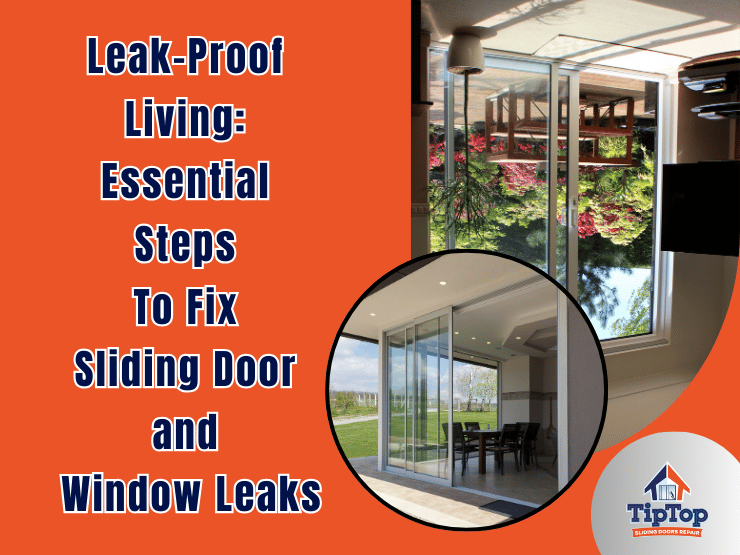Ever noticed a small puddle by your sliding doors or a faint draft coming through the window after a storm? It’s one of those little annoyances that can turn into a big problem if left unchecked. Leaks in sliding doors and windows are more than a minor inconvenience—they can lead to water damage, increased energy bills, and even mold growth over time.
At Tip Top Sliding Doors, we know just how important it is to keep your home safe, dry, and comfortable. As a trusted Sliding Door Repair Company in Boynton Beach, we’re here to guide you through the essential steps to fix those leaks and show you when it might be time to call in a professional.
Understanding the Common Causes of Leaks
Leaks in sliding doors and windows can arise from several common issues. Here are the main culprits to look out for:
1. Worn or Damaged Seals
Seals around sliding doors and windows are designed to keep water and drafts out. But over time, exposure to sunlight, moisture, and temperature changes can cause them to crack or wear down. Once compromised, these seals allow water to seep in, creating a leaky mess.
2. Poor Installation
Sometimes, the issue goes back to how the door or window was installed. Misalignment or gaps during installation can lead to leaks, especially if no weatherproofing materials were used. As a Sliding Door Repair Company, we see this issue often, and it’s something that only a skilled repair can address fully.
3. Blocked Drainage Channels
Many sliding doors come with built-in drainage channels to direct water away from your home. However, dirt and debris can clog these channels over time, causing water to pool and eventually leak into your home.
Step-by-Step Guide to Fixing Leaks
With these causes in mind, let’s dive into how you can take control and fix leaks around your sliding doors and windows.
Step 1: Inspect and Identify the Leak Source
Start by carefully inspecting your sliding doors and windows for signs of leaks. Look for any visible gaps, water stains, or signs of moisture buildup around the frame. If it hasn’t rained recently, you can simulate rain by spraying water outside and checking for any leaks inside. Knowing exactly where the leak is coming from will guide you in choosing the right repair approach.
Step 2: Replace Worn Seals and Weatherstripping
If you notice that the seals or weatherstripping are cracked, brittle, or missing, replacing them is an essential first step. Here’s how:
- Measure the length and width of the damaged seals or weatherstripping.
- Purchase replacement weatherproofing materials from a local hardware store.
- Remove the old weatherstripping or seals and clean the area.
- Apply the new weatherstripping, pressing down firmly to ensure a snug fit.
Replacing seals and weatherstripping can go a long way in keeping water and drafts out, improving both comfort and energy efficiency.
Step 3: Clear the Drainage Channels
Clogged drainage channels are a surprisingly common source of leaks. If your sliding doors have drainage channels, check them for blockages. Here’s a quick method to clear them out:
- Use a brush or vacuum to remove any dirt or debris blocking the channels.
- Flush the channels with water to ensure they are clear.
- Keeping these channels open allows water to drain properly, preventing it from seeping inside.
Step 4: Check and Refresh Caulking
Caulking around sliding doors and windows can crack and shrink over time, creating gaps where water can sneak in. Reapplying caulk is an easy fix:
- Remove the old caulk with a scraper or putty knife.
- Clean the surface and let it dry.
- Apply a bead of new, weather-resistant caulk around the door or window frame.
- Smooth the caulk with your finger or a finishing tool.
Fresh caulking is an effective barrier against leaks and is a relatively simple DIY job.
Step 5: Install Door Sweeps or Thresholds
Adding a door sweep or threshold can help block water from entering underneath your sliding doors. This is especially useful if your door is on an exposed wall that’s more vulnerable to rain and wind. Door sweeps are easy to install and add an extra layer of defense against leaks.
When to Call the Experts
Sometimes, no amount of DIY effort seems to stop the leak. This could mean the issue is related to structural problems or poor installation—cases where only a professional can provide a lasting solution. That’s where we come in. As a trusted Sliding Door Repair Company, we have the experience and tools to diagnose and fix even the trickiest leaks, preventing potential water damage that can turn into a much bigger problem down the line.
Keep Your Home Dry with Tip Top Sliding Doors
Leaks can be bothersome, but with a little bit of effort, you can tackle many minor issues on your own. However, if the problem persists, don’t hesitate to reach out to a professional Sliding Door Repair Service in Boynton Beach. We’re here to ensure that your home remains a safe, dry, and comfortable space for you and your family.
If you’re facing a stubborn leak or want an expert opinion, give us a call today. Our team at Tip Top Sliding Doors is ready to help you with everything from inspection to professional repairs. Don’t let a leak compromise your peace of mind—let us help you keep your home in perfect shape.
